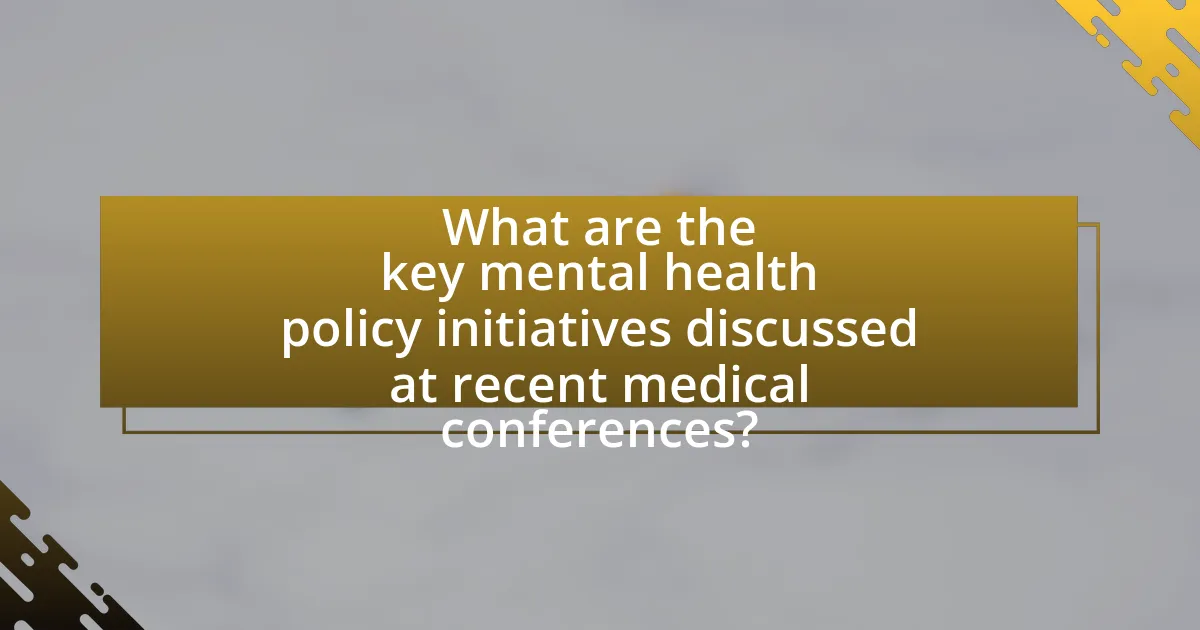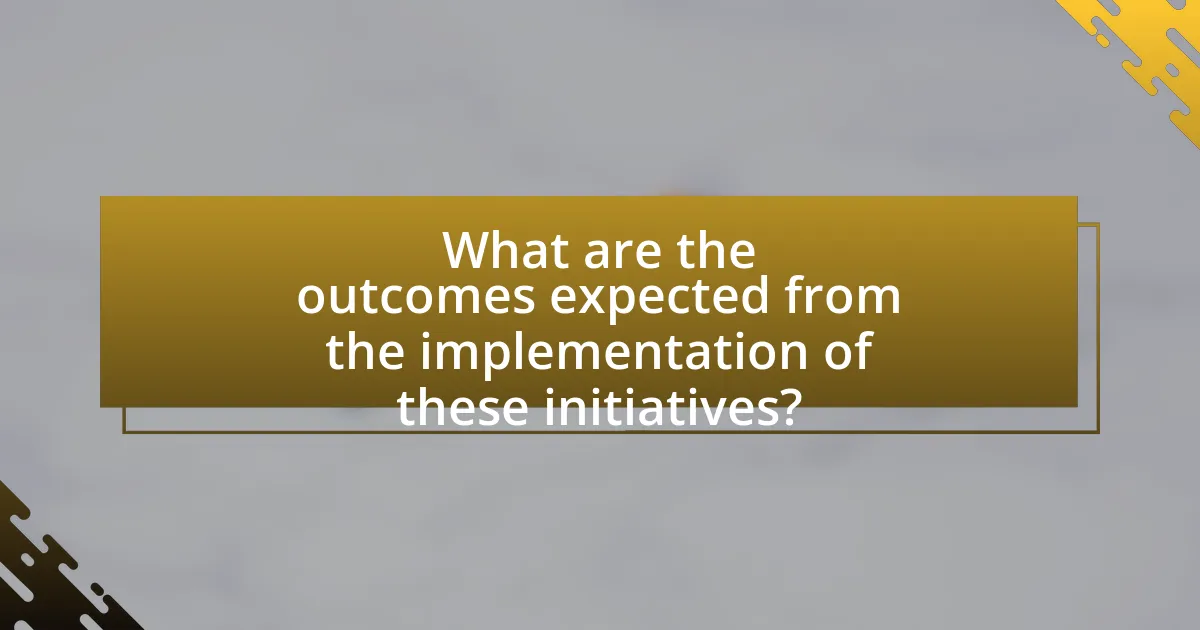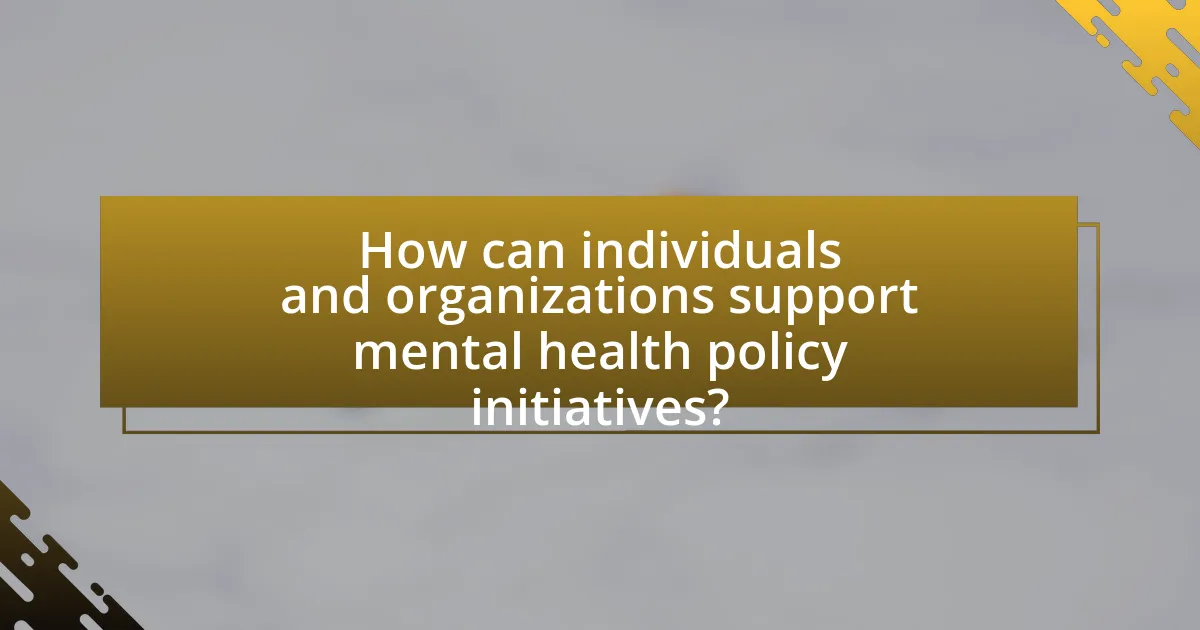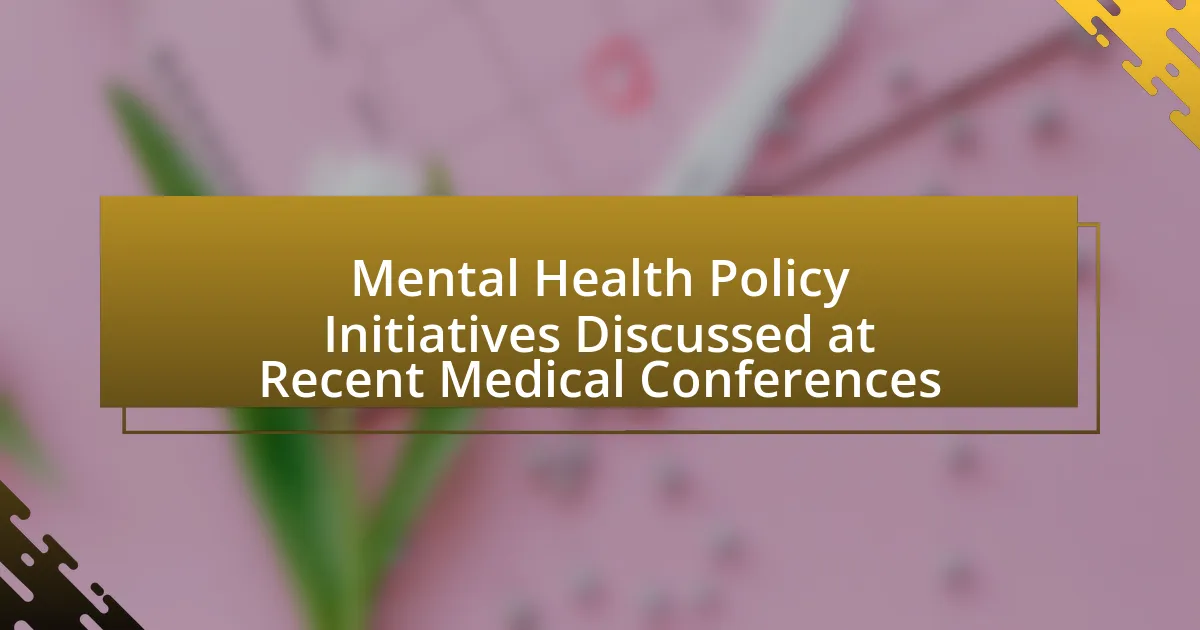The article focuses on key mental health policy initiatives discussed at recent medical conferences, highlighting the integration of mental health services into primary care, the expansion of telehealth, and stigma reduction campaigns. These initiatives aim to enhance access to mental health care, improve service quality, and address prevalent issues such as depression, anxiety disorders, and substance use disorders. The article also examines the role of stakeholders in shaping these policies, the expected outcomes from their implementation, and the challenges faced in the current mental health system. Additionally, it outlines how individuals and organizations can support these initiatives to foster a more effective mental health care framework.

What are the key mental health policy initiatives discussed at recent medical conferences?
Key mental health policy initiatives discussed at recent medical conferences include the integration of mental health services into primary care, the expansion of telehealth services, and the promotion of mental health awareness and stigma reduction campaigns. These initiatives aim to improve access to mental health care, enhance the quality of services, and foster a supportive environment for individuals experiencing mental health challenges. For instance, the World Health Organization emphasizes the importance of integrating mental health into primary health care systems to ensure comprehensive care, which has been a focal point in discussions at various conferences. Additionally, the rise of telehealth has been highlighted as a crucial response to the COVID-19 pandemic, allowing for continued access to mental health services despite physical distancing measures.
How do these initiatives address current mental health challenges?
These initiatives address current mental health challenges by implementing evidence-based strategies that enhance access to care, reduce stigma, and promote early intervention. For instance, recent policies discussed at medical conferences emphasize the integration of mental health services into primary care settings, which has been shown to improve patient outcomes and increase treatment adherence. Additionally, initiatives focusing on public awareness campaigns aim to educate communities about mental health issues, thereby reducing stigma and encouraging individuals to seek help. Research indicates that such approaches can lead to a significant increase in the number of people accessing mental health services, ultimately addressing the growing demand for mental health support.
What specific mental health issues are prioritized in these initiatives?
The specific mental health issues prioritized in these initiatives include depression, anxiety disorders, and substance use disorders. Recent medical conferences have highlighted the increasing prevalence of these conditions, with studies indicating that depression affects over 264 million people globally, while anxiety disorders impact approximately 284 million individuals. Additionally, substance use disorders have been recognized as a significant public health concern, contributing to rising rates of addiction and overdose deaths. These statistics underscore the urgent need for targeted interventions and policies to address these critical mental health challenges.
How do these initiatives aim to improve access to mental health care?
These initiatives aim to improve access to mental health care by increasing funding for mental health services, expanding telehealth options, and integrating mental health care into primary health care settings. Increased funding allows for more resources to be allocated to mental health programs, which can lead to the hiring of additional mental health professionals and the development of community-based services. Expanding telehealth options provides patients with greater flexibility and convenience, enabling them to receive care remotely, which is particularly beneficial for those in underserved areas. Integrating mental health care into primary health care settings ensures that mental health services are more readily available and reduces the stigma associated with seeking mental health treatment. These strategies collectively enhance accessibility and improve overall mental health outcomes.
What role do stakeholders play in shaping these mental health policy initiatives?
Stakeholders play a crucial role in shaping mental health policy initiatives by providing diverse perspectives, resources, and advocacy efforts that influence decision-making processes. Their involvement ensures that policies are reflective of the needs and experiences of various groups, including patients, healthcare providers, and community organizations. For instance, stakeholders such as mental health professionals contribute clinical insights, while advocacy groups highlight the lived experiences of individuals with mental health conditions, thereby driving the agenda for more inclusive and effective policies. Research indicates that stakeholder engagement leads to more comprehensive policy frameworks, as seen in initiatives like the National Mental Health Strategy, which incorporates feedback from a wide range of stakeholders to address systemic issues in mental health care.
Who are the primary stakeholders involved in these discussions?
The primary stakeholders involved in discussions about mental health policy initiatives at recent medical conferences include healthcare professionals, policymakers, mental health organizations, and patients. Healthcare professionals, such as psychiatrists and psychologists, provide clinical insights and expertise. Policymakers are crucial for shaping and implementing mental health legislation. Mental health organizations advocate for patient rights and access to care, while patients themselves offer valuable perspectives on their needs and experiences. These stakeholders collectively influence the development and effectiveness of mental health policies.
How do stakeholder perspectives influence policy outcomes?
Stakeholder perspectives significantly influence policy outcomes by shaping the priorities and decisions made by policymakers. For instance, when mental health professionals, patients, and advocacy groups express their views during medical conferences, these insights can lead to the development of policies that better address the needs of those affected by mental health issues. Research shows that inclusive stakeholder engagement can result in more effective mental health policies, as evidenced by the World Health Organization’s emphasis on community involvement in mental health initiatives, which has led to improved service delivery in various countries.

What are the outcomes expected from the implementation of these initiatives?
The expected outcomes from the implementation of mental health policy initiatives discussed at recent medical conferences include improved access to mental health services, enhanced quality of care, and reduced stigma surrounding mental health issues. These initiatives aim to increase funding for mental health programs, which can lead to a greater availability of resources and support for individuals in need. Evidence from various studies indicates that increased access to mental health care correlates with better patient outcomes, including reduced symptoms and improved overall well-being. Additionally, initiatives focused on education and awareness can significantly decrease stigma, encouraging more individuals to seek help and support.
How will these initiatives impact mental health services delivery?
These initiatives will enhance mental health services delivery by promoting integrated care models that facilitate collaboration among healthcare providers. For instance, recent policy discussions emphasize the importance of interdisciplinary teams, which can lead to improved patient outcomes through coordinated treatment plans. Evidence from the National Institute of Mental Health indicates that integrated care approaches can reduce hospitalizations by up to 30%, demonstrating the effectiveness of these initiatives in streamlining service delivery and improving access to care.
What changes can be anticipated in service accessibility and quality?
Anticipated changes in service accessibility and quality in mental health care include increased availability of telehealth services and enhanced integration of mental health into primary care settings. Telehealth has been shown to improve access, particularly in rural areas, as evidenced by a 2021 study published in the Journal of Telemedicine and Telecare, which reported a 50% increase in patient engagement through virtual platforms. Additionally, integrating mental health services into primary care can lead to better health outcomes, as highlighted by the World Health Organization, which states that such integration can reduce stigma and improve treatment adherence. These initiatives are expected to enhance both the reach and effectiveness of mental health services.
How will these initiatives affect mental health awareness and education?
These initiatives will significantly enhance mental health awareness and education by promoting evidence-based practices and increasing public understanding of mental health issues. For instance, initiatives discussed at recent medical conferences often include training programs for healthcare professionals, which improve their ability to identify and address mental health conditions effectively. Research indicates that increased training leads to better patient outcomes, as healthcare providers become more adept at recognizing symptoms and providing appropriate interventions. Furthermore, public campaigns associated with these initiatives aim to reduce stigma and encourage individuals to seek help, thereby fostering a more informed and supportive community regarding mental health.
What challenges might arise during the implementation of these initiatives?
Challenges that might arise during the implementation of mental health policy initiatives include funding limitations, stakeholder resistance, and insufficient training for healthcare providers. Funding limitations can hinder the allocation of necessary resources, as evidenced by a 2021 report from the National Alliance on Mental Illness, which highlighted that 60% of states reported budget cuts affecting mental health services. Stakeholder resistance may stem from differing priorities among policymakers, healthcare providers, and community organizations, complicating collaborative efforts. Additionally, insufficient training for healthcare providers can lead to ineffective implementation of new policies, as indicated by a study published in the Journal of Mental Health in 2020, which found that 40% of providers felt unprepared to implement new mental health initiatives.
What barriers exist in the current mental health system?
Barriers in the current mental health system include stigma, lack of access to care, insufficient funding, and workforce shortages. Stigma surrounding mental health often prevents individuals from seeking help, as societal perceptions can lead to discrimination. Lack of access to care is exacerbated by geographic disparities, particularly in rural areas where mental health services are limited. Insufficient funding for mental health programs results in inadequate resources and support for those in need. Additionally, workforce shortages, particularly of trained mental health professionals, hinder the ability to provide timely and effective care. According to the National Alliance on Mental Illness, nearly 60% of adults with a mental illness did not receive mental health services in the previous year, highlighting the critical gaps in the system.
How can these challenges be addressed effectively?
To address the challenges in mental health policy initiatives effectively, stakeholders must implement comprehensive strategies that include increased funding, enhanced training for healthcare providers, and improved access to mental health services. Increased funding can support innovative programs and research, as evidenced by the National Institute of Mental Health’s budget, which has seen a significant rise to over $2.1 billion in recent years, facilitating advancements in mental health treatment. Enhanced training for healthcare providers ensures they are equipped to recognize and treat mental health issues, which is crucial given that a study published in the Journal of the American Medical Association found that only 50% of primary care physicians feel confident in diagnosing mental health conditions. Improved access to mental health services, such as telehealth options, can reduce barriers to care, as demonstrated by a 2020 report from the Substance Abuse and Mental Health Services Administration, which indicated that telehealth increased access for underserved populations by 30%. These strategies collectively create a more robust framework for addressing mental health challenges effectively.

How can individuals and organizations support mental health policy initiatives?
Individuals and organizations can support mental health policy initiatives by advocating for policy changes, participating in awareness campaigns, and collaborating with mental health professionals. Advocacy efforts can include contacting legislators to express support for mental health funding and legislation, which is crucial as studies show that increased funding leads to improved mental health services and outcomes. Participation in awareness campaigns helps to reduce stigma and educate the public about mental health issues, which is essential for fostering a supportive environment. Collaboration with mental health professionals ensures that initiatives are informed by expert knowledge and best practices, enhancing the effectiveness of policies aimed at improving mental health care.
What actions can individuals take to advocate for mental health policies?
Individuals can advocate for mental health policies by engaging in grassroots activism, participating in public forums, and contacting legislators. Grassroots activism involves organizing or joining local campaigns that raise awareness about mental health issues and promote policy changes. Participation in public forums allows individuals to voice their concerns and share personal experiences, which can influence policymakers. Contacting legislators directly through emails, phone calls, or meetings can effectively communicate the need for specific mental health policies. According to the National Alliance on Mental Illness, advocacy efforts can lead to significant legislative changes, as seen in the passage of the Mental Health Parity and Addiction Equity Act, which aimed to ensure equal treatment for mental health conditions.
How can community engagement enhance the effectiveness of these initiatives?
Community engagement can enhance the effectiveness of mental health policy initiatives by fostering collaboration between stakeholders, including healthcare providers, patients, and community organizations. This collaboration ensures that initiatives are tailored to the specific needs and preferences of the community, leading to higher acceptance and participation rates. For example, research published in the “American Journal of Public Health” indicates that community-driven approaches in mental health programs result in improved outcomes, as they incorporate local knowledge and resources. Engaging the community also builds trust, which is essential for effective communication and support, ultimately leading to more sustainable mental health initiatives.
What best practices should organizations follow to align with these initiatives?
Organizations should implement comprehensive mental health policies that prioritize employee well-being and promote a supportive work environment. These policies should include regular mental health training for management, ensuring that leaders are equipped to recognize and address mental health issues among employees. Additionally, organizations should establish clear communication channels for employees to seek help without stigma, fostering an open culture around mental health discussions.
Evidence from the World Health Organization indicates that workplaces that actively support mental health can lead to a 30% reduction in absenteeism and a 20% increase in productivity. Furthermore, integrating mental health resources, such as Employee Assistance Programs, can provide employees with immediate access to professional support, aligning with best practices discussed at recent medical conferences.
How can organizations measure the impact of their support for mental health policies?
Organizations can measure the impact of their support for mental health policies through quantitative metrics such as employee surveys, mental health incident rates, and productivity levels. For instance, implementing regular employee surveys can provide data on employee well-being and satisfaction, while tracking mental health-related absenteeism can reveal the effectiveness of policies. A study published in the Journal of Occupational Health Psychology found that organizations with robust mental health policies reported a 30% reduction in absenteeism and a 20% increase in productivity. This data-driven approach allows organizations to assess the direct outcomes of their mental health initiatives and make informed adjustments as necessary.

Leave a Reply